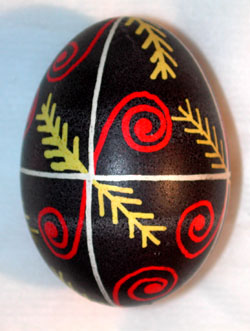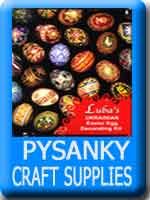COLORS
LIGHT TO DARK
1. Yellow
2. Orange
3. Scarlet
4. Pink
5. Red
6. Light Blue
7. Light Green
8. Turquoise
9. Gold |
10. Pumpkin
11. Brick
12. Brown
13. Dark Red
14. Purple
15.Royal Blue
16.Dark Green
17.Black |
FIGURE 12 |
STEP 9
DECIDE COLORS
While your egg is drying, now is the time to consider your color scheme.
Colors
are symbolic and that should be considered when you make your selection.
You need to choose 3 colors for this design..The order is important, light
colors before dark colors.(See FIGURE 12) This is somewhat a rule of thumb
for dying, but not all colors will cover the prior colors on the chart.
For instance, black is about the only color that will cover light green.
The underlying color changes the hue, tint and brilliance of the colors
that follow. To follow the tutorial choose lightest color for the Pine
needles, another color for the Curls and a dark color as the last color. |
|
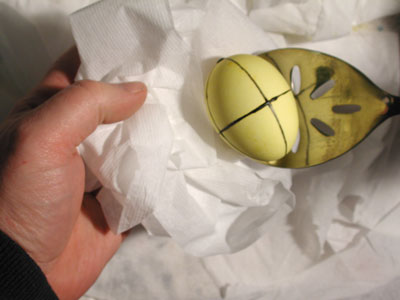
FIGURE 13 |
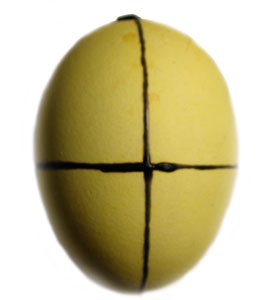
FIGURE 14 |
STEP 10
FIRST COLOR
Place the now clean egg on your Slotted
Spoon and carefully lower it into the jar of dye. This is where people
tend to break their eggs and ruin the dye. Lower it on the spoon and let
it slowly roll off into the bottom of the dye jar. Leave
in the dye for 5 to 10 minutes. The time depends on how fresh the dye is.
For recently made dye, the first egg may only take a minute or two to sufficiently
be colored. Check it every few minutes, lifting it carefully out of the
dye. When you are satisfied, lift it up out of the liquid and let the dye
drain back into the jar. Take a fresh piece of tissue in your other hand
and carefully transfer it over from the spoon. (FIGURE 13) Dab it dry,
avoiding to rub the egg. Place it in an egg stand to dry. I also
like to place a clean piece of tissue under the egg in the stand to prevent
any previous colors on the stand from bleeding onto the egg. When dry the
color should be uniform (FIGURE 14). |
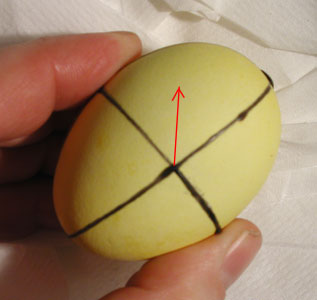
FIGURE 15 |
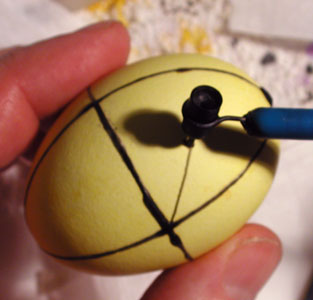
FIGURE 16 |
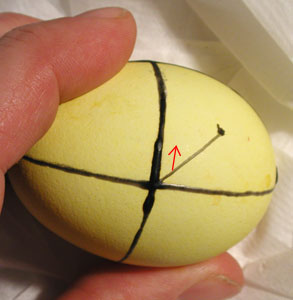
FIGURE 17 |
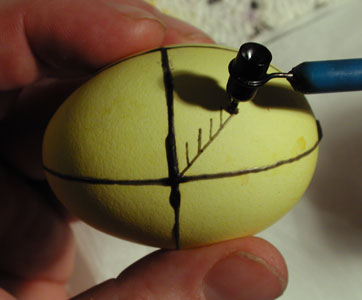
FIGURE 18 |
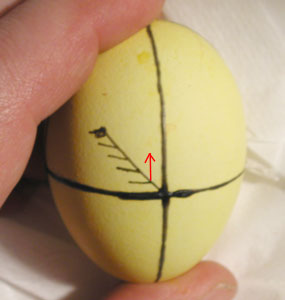
FIGURE 19 |
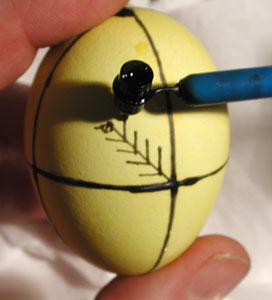
FIGURE 20 |
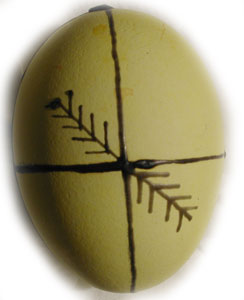
FIGURE 21 |
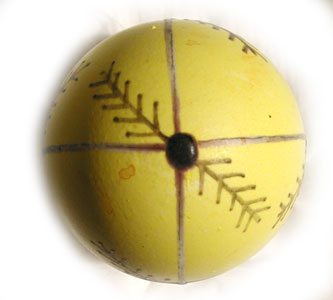
FIGURE 22 |
STEP 11
DRAW PINE NEEDLE SYMBOLS ON FIRST COLOR
Whatever is drawn on the egg with wax now will be the color of the egg
at this point. In our example, all lines drawn in this step will
be yellow. For this design, we will draw the pine needles. These are easy
and fun to draw. No guidelines are needed. Fill your kistka with
wax and get it hot. Position the egg in your hand, so that the lines form
a "V" (FIGURE 15) away from yourself. Draw a line, which will be
the branch that splits the "V" (FIGURE 16).Rotate the egg slightly (FIGURE
17) and draw all of the needles on one side of the branch.(FIGURE 18).
Flip the egg around (FIGURE 19) and then draw the needles on the other
side of the branch (FIGURE 20). Roll the egg 90 degrees and repeat the
process at the next intersection and draw 2 more pine needle branches the
same way. Repeat twice more, until 4 pairs of branches are drawn. Then
draw the same symbols on the top and bottom of the egg (FIGURE 22) to finish.
The key is to be moving your wrist the same way for each stroke.
To make this easy, reposition the egg.
The result being that we always draw in the same direction (See
the Red Arrows) |

